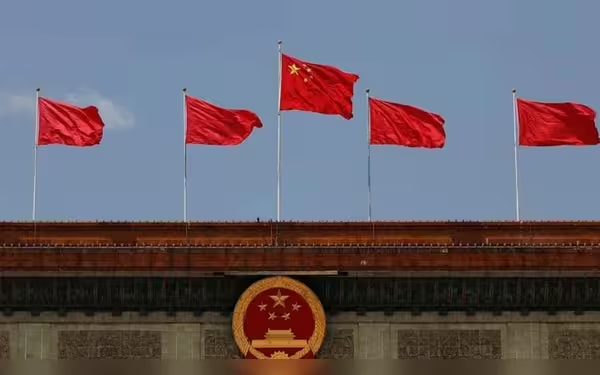Saturday, November 16, 2024 07:38 PM
China's Economic Ascendancy: A New Era of Global Leadership
- China's Belt and Road Initiative spans over 50 countries.
- Foreign investments in China reached a record high last year.
- China addresses trade disputes through WTO mechanisms.
 Image Credits: thenews
Image Credits: thenewsChina's economic strategies and initiatives are reshaping global leadership and attracting foreign investments.
In recent years, China has emerged as a significant player in the global economy, contributing nearly one-third to global economic growth. This shift is not just about numbers; it reflects China's ambition to reshape the international landscape. By implementing various projects aimed at stimulating growth, China has not only lifted its own economy but has also provided opportunities for other nations, particularly those in the developing world.
One of the most notable initiatives is the Belt and Road Initiative, a massive $900 billion project that spans over 50 countries. This initiative is designed to enhance infrastructure and economic collaboration, positioning China as a leader in global development. Furthermore, China is planning new investments in artificial intelligence, industrial capacity, and digital collaboration centers, which are expected to attract even more countries to partner with it.
China has also established innovative multilateral organizations, such as the Asian Infrastructure Investment Bank and the New Development Bank. These institutions aim to address global infrastructure needs while promoting economic equity, particularly appealing to the Global South. Many countries in this region are increasingly cautious of the stringent conditions imposed by traditional global monetary institutions, which often prioritize the interests of Western capitalist nations.
Interestingly, China is not violating free market principles; instead, it is leveraging them to protect its financial interests while simultaneously creating opportunities for Western businesses. This strategy has proven effective, as evidenced by the establishment of 53,766 new foreign-invested enterprises in China last year, marking a remarkable 39.7 percent increase from the previous year. The high-tech manufacturing sector alone saw a 6.5 percent growth in actual foreign investment, indicating that China is focusing on attracting foreign capital into higher value-added sectors.
According to reports, major multinational companies are increasingly interested in China. For instance, Apple plans to set up new research and development centers in Shenzhen and Shanghai, while AstraZeneca intends to establish an advanced drug manufacturing unit. Additionally, several global automakers are planning to create R&D hubs in China. This influx of foreign capital is expected to bring advanced technologies that will enhance efficiency and foster innovation through collaboration with Chinese companies.
In a significant move to further open its market, China recently introduced a new "negative list" that removes restrictions on foreign companies entering the manufacturing sector. This includes the auto industry, where equity caps on foreign commercial vehicle manufacturers were lifted in 2020, and similar restrictions for passenger vehicle makers were removed in 2022. Such measures demonstrate China's commitment to fostering open collaboration, which is likely to attract high-level foreign partners across various industries.
Moreover, China's service sector is also experiencing substantial growth. In the first eight months of this year, China's foreign trade in services reached 4.89 trillion yuan (approximately $686.44 billion), reflecting a 14.3 percent year-on-year increase. This growth highlights the potential for global service trade enterprises to thrive in China.
In the realm of trade disputes, China is adhering to the mechanisms established by the global capitalist order. Instead of engaging in direct confrontations, it utilizes platforms like the World Trade Organization (WTO) to address contentious trade decisions made by Western governments. For example, China filed a lawsuit against the EU regarding its anti-subsidy measures targeting Chinese electric vehicles, showcasing its commitment to protecting its industries while promoting global cooperation.
Despite being a communist country, China appears dedicated to following free-market principles and respecting the frameworks established by the rules-based world order. A spokesperson for the Chinese Ministry of Commerce criticized the EU's final ruling on the anti-subsidy case, stating, "The EU’s final ruling lacks a factual and legal basis, which violates WTO rules and constitutes an abuse of trade remedy measures." This highlights China's approach of using free-market logic to counter Western criticisms.
China's quest for global leadership is marked by its strategic use of economic principles and its commitment to fostering international collaboration. As it continues to attract foreign investments and expand its influence, the world watches closely. The implications of China's actions will not only shape its future but also the global economic landscape, making it essential for other nations to adapt and respond to this evolving dynamic.













